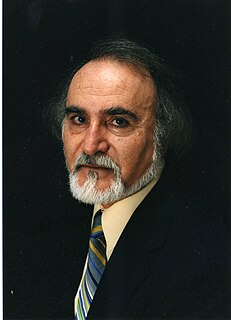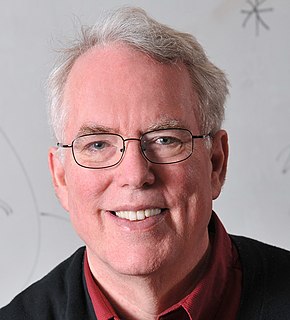
The General Services Administration (GSA) is an independent agency of the United States government established in 1949 to help manage and support the basic functioning of federal agencies. GSA supplies products and communications for U.S. government offices, provides transportation and office space to federal employees, and develops government-wide cost-minimizing policies and other management tasks.
The American Association for Cancer Research (AACR) is the world's oldest and largest professional association related to cancer research. Based in Philadelphia, the AACR focuses on all aspects of cancer research, including basic, clinical, and translational research into the etiology, prevention, diagnosis, and treatment of cancer. Founded in 1907 by 11 physicians and scientists, the organization now has more than 42,000 members in over 120 countries. The mission of the AACR is to prevent and cure cancer through research, education, communication, collaboration, science policy and advocacy, and funding for cancer research.
Elliot Meyerowitz is an American biologist.
The Larry Sandler Memorial Award is a prestigious international award given for research in the Drosophila community. The award is given for the best dissertation of the preceding year, and is given at the annual Drosophila Research Conference. Awardees may be nominated only by their graduate advisors.
Wilson Stuart Stone was an American geneticist and zoologist. Stone received his bachelor, Masters and PhD at the University of Texas and joined the department of zoology in 1932. Stone mentors were J. T. Patterson, H.J. Muller, and Theophilus Painter. Stone work was primarily in radiation genetics, drosophila speciation, and population genetics. In 1946 along with Wyss and Hass demonstrated the indirect of effects of ultraviolet radiation causing mutations in bacteria.
The Federation of American Societies for Experimental Biology, abbreviated FASEB, is a non-profit organization that is the principal umbrella organization of U.S. societies in the field of biological and medical research. FASEB organizes academic conferences and publishes scientific literature.

The American Genetic Association (AGA), formerly the American Breeders' Association, is a USA-based learned society dedicated to the study of genetics. Founded in 1903, the organization publishes the Journal of Heredity.
The American Society of Human Genetics (ASHG), founded in 1948, is the primary professional membership organization for specialists in human genetics worldwide. As of 2009, the organization had approximately 8,000 members. The Society's members include researchers, academicians, clinicians, laboratory practice professionals, genetic counselors, nurses, and others who have a special interest in the field of human genetics.
The Genetics Society of America (GSA) is a scholarly membership society of more than 5,500 genetics researchers and educators, established in 1931. The Society was formed from the reorganization of the Joint Genetics Sections of the American Society of Zoologists and the Botanical Society of America.

Manuel Berberian is an Iranian-Armenian earth scientist, he was born on the 27th of October, 1945 into an immigrant Armenian family in Tehran. He specializes in earthquake seismology, active faulting and folding, active tectonics, continental tectonics, historical seismicity, archaeoseismicity, earthquake hazard minimization, geological mapping, and environmental science and engineering.
The Edward Novitski Prize is awarded by the Genetics Society of America (GSA) to recognize an extraordinary level of creativity and intellectual ingenuity in solving significant problems in genetics research.
Laurence Marvin Sandler (1929–1987) was a "leading Drosophila geneticist", active during the mid-20th century. Sandler is best known for his work establishing and elucidating the phenomenon of meiotic drive.
David Swenson Hogness was an American biochemist, geneticist, and developmental biologist and emeritus professor at the Stanford University School of Medicine in Stanford, California.

Jeffrey Connor Hall is an American geneticist and chronobiologist. Hall is Professor Emeritus of Biology at Brandeis University and currently resides in Cambridge, Maine.
Amitabh Joshi is an Indian evolutionary biologist, geneticist and a professor at Jawaharlal Nehru Centre for Advanced Scientific Research (JNCASR). He heads the Evolutionary Biology Laboratory at JNCASR and is known for his studies on Genetics and Population ecology. An elected fellow of the Indian Academy of Sciences, National Academy of Sciences, India, and Indian National Science Academy, he is also a J. C. Bose National Fellow of the Department of Science and Technology. The Council of Scientific and Industrial Research, the apex agency of the Government of India for scientific research, awarded him the Shanti Swarup Bhatnagar Prize for Science and Technology, one of the highest Indian science awards, in 2009, for his contributions to biological sciences.
Daniel L. Hartl is the Higgins Professor of Biology in the Department of Organismic and Evolutionary Biology at Harvard University. He is also a principal investigator at the Hartl Laboratory at Harvard University. His research interests are focused on evolutionary genomics, molecular evolution, and population genetics.
Terry L. Orr-Weaver is an American molecular biologist in the MIT Department of Biology with a joint appointment to the Whitehead Institute. She does research on developmental biology, with a focus on "[c]oordination of cell growth and division with development, with particular focus on the oocyte-to-embryo transition, control of cell size, and regulation of metazoan DNA replication." Orr-Weaver and her collaborators have identified two proteins necessary for the proper sorting of chromosomes during meiosis with implications for cancer and birth defects. In 2006 she was elected to the National Academy of Sciences.
Bruce Stewart Baker was an American geneticist.

R. Scott Hawley is an American geneticist and investigator at the Stowers Institute for Medical Research in Kansas City, Missouri, a member of the US National Academy of sciences and fellow of the American Association for the Advancement of Science. He has been President of the Genetics Society of America, and leads a research team focused on the molecular mechanisms that regulate chromosome behavior during meiosis.
Therese Ann Markow is the Amylin Chair in Life Sciences at the University of California, San Diego. Her research involves the use of genetics and ecology to study the insects of the Sonoran Desert. She was awarded the Presidential Early Career Award for Scientists and Engineers in 2001 and the Genetics Society of America George Beadle Award in 2012.




